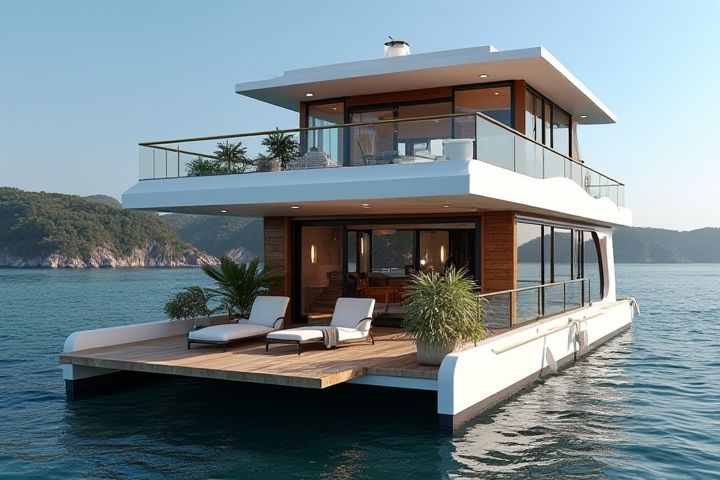
Houseboat prices vary widely, influenced by factors such as size, location, and amenities. A basic, smaller houseboat can start around $20,000, while luxurious models with high-end finishes can exceed $1 million. Ongoing costs like docking fees, maintenance, and insurance also contribute to overall expenses. If you're considering purchasing a houseboat, research your ideal location's market and assess long-term living costs. Evaluating financing options can help you afford your dream floating home.
Are Houseboats Expensive
Cost of Purchase
Houseboat prices can vary significantly based on factors such as size, age, and features. On average, a new houseboat can range from $30,000 to over $500,000, with many models falling within the $100,000 to $200,000 range. When considering used houseboats, prices typically start around $10,000, but older vessels may require additional investment for repairs and maintenance. Your budget should also account for ongoing costs like mooring fees, insurance, and utilities, which can add thousands to your annual expenses.
Maintenance Costs
Houseboats can incur significant maintenance costs, often ranging between $500 to $2,000 annually, depending on size, age, and condition. Regular upkeep, including hull cleaning and painting, is essential to prevent wear from water and salt exposure. You should also factor in systems maintenance, such as plumbing and electrical repairs, which may add $300 to $1,500 yearly. Additionally, docking fees can cost anywhere from $100 to $1,500 per month, impacting your overall budget for houseboat ownership.
Insurance Expenses
Houseboat insurance expenses can vary significantly based on several factors, including the value of the houseboat, its size, location, and how you intend to use it. Generally, premiums are higher for houseboats compared to traditional homes, reflecting risks associated with waterborne living. You should consider coverage options such as liability, property damage, and personal belongings, as these can impact your overall costs. It's essential to compare quotes from various insurers to find the best policy that fits your budget while adequately protecting your investment.
Mooring Fees
Mooring fees significantly impact the overall cost of owning a houseboat. These fees can vary widely depending on the location, amenities, and demand; prime waterfront spots may charge premium rates. In addition to location, the type of mooring--such as marina moorings versus anchorages--affects pricing. You should consider these fees in your budget, as they can range from a few hundred to several thousand dollars annually.
Utility Bills
Houseboats can present unique utility costs that may influence your overall expense considerations. For example, electricity rates can vary widely depending on your location and whether you rely on dock power or generators. Water supply could incur additional charges, especially if you're not connected to municipal systems, necessitating regular maintenance and efficient waste disposal methods. To budget effectively, it's crucial to assess these potential utility bills and understand how they differ from traditional home living.
Depreciation Value
Houseboats typically experience rapid depreciation, with values dropping by 20% to 40% within the first few years. This decline is influenced by factors such as the boat's age, condition, and market demand; for example, a new houseboat valued at $100,000 might only be worth $60,000 after five years. Furthermore, ongoing maintenance, docking fees, and insurance costs can compound the financial burden, making houseboats potentially expensive long-term investments. You should carefully assess your budget and expected usage to understand the true cost of owning a houseboat.
Financing Options
Financing options for houseboats can vary significantly, often determined by factors such as the boat's size, condition, and your credit history. Many lenders offer specialized loans for recreational vehicles, including houseboats, with terms typically ranging from 10 to 20 years. You may also consider personal loans or home equity lines of credit if you already own property. Understanding your financial situation and exploring various lenders can help you find the most suitable financing option for your houseboat purchase.
Renovation Costs
Renovation costs for houseboats can vary significantly depending on several factors, including the size, age, and condition of the vessel. A fundamental restoration may involve expenses related to structural repairs, plumbing upgrades, and electrical system enhancements, which can quickly add up to thousands of dollars. Moreover, specialized materials suitable for marine environments often come with higher price tags, increasing your overall investment. If you're considering a houseboat renovation, it's essential to budget for both visible improvements and hidden issues, ensuring a comprehensive assessment of the project.
Regional Price Variations
Houseboat prices vary significantly across different regions due to factors like local demand, waterfront property availability, and amenities offered. In popular tourist destinations, such as Lake Tahoe or the Florida Keys, houseboats can be considerably more expensive, often ranging from $100,000 to over $500,000. Conversely, areas with less demand, like smaller lakes or rivers in rural regions, may offer houseboats starting around $30,000, providing more budget-friendly options. To find the best deal, consider researching regional market trends and assessing local marina services, which can greatly influence overall costs.
Seasonal Demand Effects
Houseboat prices can significantly fluctuate based on seasonal demand effects, particularly in popular areas. During peak seasons, such as summer or holiday weekends, you may find rental rates and sales prices soaring due to increased interest from vacationers seeking unique experiences on the water. Conversely, off-peak seasons may lead to reduced prices as demand drops, providing you with potential savings if you can be flexible with your timing. Understanding these seasonal patterns can help you make a more informed decision when considering the purchase or rental of a houseboat.
